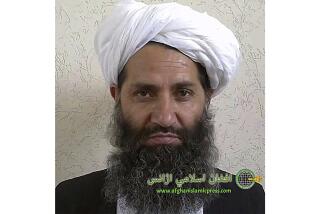Dalai Lama Speaks to Vietnamese
- Share via
In his first speech before a gathering of Vietnamese Buddhists, the Dalai Lama on Saturday urged the audience as individuals to live with compassion and as a group to focus on education for the younger generation, the strength of their collective future.
But what drew the most applause and even a few tears from spectators was a reference in his speech that compared Tibet’s exiled spiritual leader to the nearly 5,000 mostly Vietnamese expatriates in the audience at the Pyramid at Cal State Long Beach.
“We both remain in other countries as refugees,” the Dalai Lama said while referring to his ongoing struggle to free Tibet from China’s rule.
“But on this earth, in these modern times, democracy and freedom is almost like an unstoppable force. . . . I feel that definitely there will be a change.”
Sitting comfortably in a maroon armchair at center stage, the spiritual leader spoke for about 40 minutes to a crowd that waited in line for hours to see him, some arriving as early as 7 a.m. to make sure they had a seat for the free event, which began at 4 p.m.
“I have always dreamed for a chance to hear him speak and I can’t believe it’s really happening,” said Phu Nguyen, 67, of Santa Ana, who stood for hours in a line that snaked through the parking lot. “This is one of the luckiest days of my life.”
The Dalai Lama, a Nobel laureate who fled to India in 1959 after a failed revolt against the Chinese government, has especially endeared himself to Vietnamese expatriates because they see him as a reflection of themselves--exiles whose countries were taken over by Communist regimes.
His stop in Long Beach to address the Vietnamese community, which has a cultural base in Orange County’s Little Saigon, was part of a tour of the United States that included lectures at UCLA and UC Santa Barbara. His audience Saturday reflected many facets of society, from college students in baggy jeans to Catholic priests with white collars.
The Tibetan spiritual leader told audience members that they must take their future in their own hands and warned that chanting and prayer alone do not make a good practicing Buddhist. It is essential, he said, to act with compassion, to strive to understand life’s complexities and to have faith in Buddha.
Without those three elements, he said, everything else can only hold “very limited” benefits to a spiritual life.
More to Read
Sign up for Essential California
The most important California stories and recommendations in your inbox every morning.
You may occasionally receive promotional content from the Los Angeles Times.










